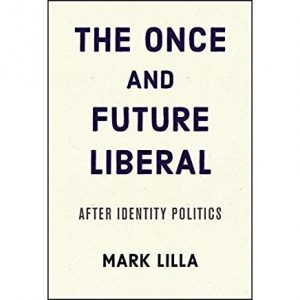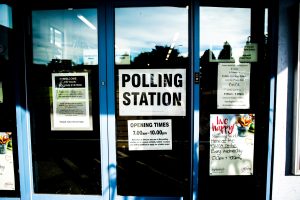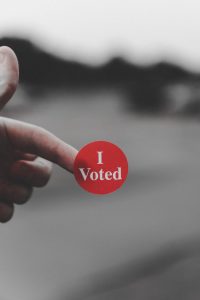Mark Lilla’s The Once and Future Liberal: After Identity Politics
![]()
I’m a social progressive, but yesterday for a split second, I considered becoming an unaffiliated voter. (I hear you clearly—in Ohio, it appears that unaffiliated voters can’t vote for candidates, only issues, in the primaries. Do correct me if I’m wrong, please.)
My dear husband was out in far neighborhoods canvassing for a brand new liberal against a career conservative. This is one of the country’s anxiously watched Congressional races. Each of the candidate’s television ads smear two good men, though, and do not set out policy in any reasonable manner. That is nothing new, but for a moment, the partisanship in Congress and within society appeared heartbreaking to me. I thought of taxes/tariffs, immigration, thousands of people in need of retraining for high tech jobs, Miami underwater in a few years, and no one being able to find a way through. Accusing, fighting, exaggerating, and insulting have become the norm in place of measured discourse.
Why not step out of the ring and walk away? I do belong to an active, missional church that serves God’s Kingdom on Earth. What good is party affiliation? After all, my Grandpa Hobby ran a non-union factory in Berne, Indiana, and he voted for Theodore Roosevelt, the trust buster. Later in a different era, he supported FDR.
Then I heard this morning’s NPR report about Amazon and Bernie Sanders, which imagined Bernie’s teeth in Amazon’s leg. Unable to swat him off, Amazon made its decision to raise wages for its workers to $15.00. It is a living wage, not a minimum wage. And government didn’t have to force them to do it. Someone who cared did.
So, I sat down for a couple hours and read Mark Lilla’s The Once and Future Liberal: After Identity Politics.

Fareed Zakaria of CNN calls it “A terrific short book about the decline of American liberalism explaining how they went from the successes of FDR’s coalition to the pitfalls of today’s identity politics. It’s an accessible book that’s essential reading for anyone who wants to understand how we arrived in the Trump era and where the Democrats go from here.”
Here are my take aways. Be kind, please. I’m only a curious citizen trying to find my way. Because Lilla seems to be scolding and encouraging his college students, among others, I’ll leave it to the collegiate types to argue his points amongst themselves. The boldface type and underlining are mine, not Lilla’s. I apologize to him for quoting the book, but I do recommend that you get a copy.
____________
Mark Lilla, a Professor of the Humanities at Columbia University and a prizewinning essayist with a ton of books, sounds a little weary of the voices of privileged kids carping at him about their individual rights and all-important identities. But he rallies and gives all liberals a thorough talking to.
His driving point is that we must become citizens again, not just identity politics groupies who don’t want to do the boring, hard work of developing political capital while winning hearts and minds. He is careful to separate his concept of citizenship from the trials of immigrants and immigration. Citizenship, to him, means the older idea that the country must survive, aided by informed, active involvement in politics—which means not only fighting to win seats (extremely important in the age of Trump) but also reaching out to the other side and finding points of agreement. Yes, first the winning, but then the compromising and essential drudgery.
To be clear, he values those in the ‘60s who worked to gain civil rights for all. ‘But during the 1970s and 1980s a shift began. The focus of attention was now less on the relation between our identification with the United States as democratic citizens and our identification with different social groups within it. Citizenship dropped out of the picture…The only meaningful question became a deeply personal one: what does my country owe me by virtue of my identity?’ pgs. 64-65.
Lilla divides recent political history into two dispensations: the Roosevelt Dispensation (the New Deal) and the Reagan Dispensation (below,) each with its own catechism. He includes the Civil Rights Movement in the Roosevelt camp, but blames liberals as well as conservatives for the Reagan Dispensation, outlined here:
- That the good life is that of self-reliant individuals—individuals embedded perhaps in families, churches, and small communities, but not citizens of a republic with common goals and duties to each other.
- That priority must be given to building rather than redistributing wealth, which allows individuals and families to maintain their independence and flourish.
- That the freer markets are, the more they will grow and enrich everyone.
- That government, to quote Reagan, ‘is the problem.’ Not tyrannical government, or inefficient government, or unjust government. Government itself. pgs. 30-31.
In a footnote, Lilla names a further contributor to the Reagan Dispensation’s movement toward individual concerns over the good of all. ‘…with the growth of suburbs, money, and individualism, churches became ‘remarkably free of dogma, guilt, and social obligation.’ pg. 32.
So, why blame liberals? Lilla is a liberal himself, but he says ‘Too many programs were introduced in the Great Society, too quickly and with rhetoric so elevated that it created exaggerated expectations, which resulted in inevitable disappointment.’ pg. 36. ‘Most foolishly, liberals grew increasingly reliant on the courts to circumvent the legislative process when it failed to deliver what they wanted…Liberals lost the habit of taking the temperature of public opinion, building consensus, and taking small steps.’ pg. 37.
(I hear your shouting, those of my friends who are already actively involved in the minutia of winning elections. Bless you.)
He continues in this vein, concluding that Americans now feel that even if they want to work together for a common good, all branches of government are so partisan and ineffective that it is of no use.

Photo by Ferran Feixas on Unsplash
He says that liberals should have counteracted Reagan’s economic individualism by teaching young people that ‘they share a destiny with all their fellow citizens and have duties toward them.’ pg. 58. But instead, ‘Liberal political education now takes place…on campuses that are largely detached socially and geographically from the rest of the country…’ pg. 59. He calls it a movement ‘From We to Me.’ pg. 65.
‘The forces at work in healthy party politics are centripetal; they encourage factions and interests to come together to work out common goals and strategies. They oblige everyone to think, or at least speak, about the common good.’ pg. 75.
In contrast to the ‘Facebook model of identity: the self as a homepage I construct like a personal brand, linked to others through associations I call “like” and “unlike” at will…Citizenship [is] the central concept of democratic politics…a bond linking all members of a political society over time, regardless of their individual characteristics, giving them both rights and duties.’ pgs. 85-86.
Ah yes, the old rights and duties talk, one worth considering every day, as far as I’m concerned. Of course, I’m an old retired middle school/junior high teacher, and we made frequent use of that lecture.
Then Lilla speaks to his students about the tsunami of identity ‘pseudo-politics’ that he feels is drowning them. ‘What replaces argument, then, is taboo. At times our more privileged campuses can seem stuck in the world of archaic religion. Only those with an approved identity status are, like shamans, allowed to speak on certain matters…Propositions become pure or impure, not true or false.’ pg. 89. College professors, particularly those from the 1960s, recognize today’s ‘student narcs’ parsing the English language. Lilla says that ‘the New Left, fresh from real political battles in the great out there…imagined launching their politically committed and informed students into the world, not watching them retreat into themselves…liberal politics aimed to inspire individuals to actively remake society. Today’s focus is on the passive social construction of individuals.’ pgs. 90-91.
So, what is there to do?
Lilla says the framers of the Constitution knew, of course, that energy needed to be focused into government, not the whims of royalty. Government and the common good were foremost in their deliberations. Today, as in times past, winning elections for county commissioner is important. Working for candidates and voting in the primaries are important. Stomping around the neighborhoods for signatures on a referendum is honorable. Listening, as well as talking, is democratic.

Photo by Elliott Stallion on Unsplash
‘…over the long period [the movements that reshaped our country for the better] are incapable of achieving concrete political ends on their own. They need system politicians and public officials…willing to engage in the slow, patient work of campaigning for office, drawing up legislation, making trades to get it passed, and then overseeing bureaucracies to see that it is enforced.’ pgs. 107-108. In other words, ‘Martin Luther King Jr…the greatest movement leader in American history…’ needed Lyndon Johnson ‘…a seasoned congressional deal maker willing to sign any pact with the devil to get the Civil Rights Act and Voting Rights Act passed.’ pg. 108.
Demos, Lilla says, is the people, and liberals have defined the people too narrowly. After the 1968 convention, the Democratic Party unintentionally marginalized blue-collar unions and officials and replaced them with educated activists, increased reliance on the courts rather than the legislative process, and ‘cast opponents as immoral monsters, rather than simply as fellow citizens with different views.’ pg. 111. Yes, Lilla is well aware of the far right media and Trump’s transgressions.
Lilla preaches his primer to liberals who want to win elections and win centrist, working-class voters back. Some of his points: elections are not prayer meetings where folks are interested in your personal identity; Americans hate to be scolded and they do much better being told that they are already good and that they can improve; stop trying to expose the degenerates and run them out of town; shut up and listen, or as he says, ‘listen and imagine.’ He talks to students, imploring them to use the generosity with which they approach people in far off lands with those in our own land, ‘the Southern Pentacostals and gun owners in the mountain states.’ Accept that they too are Americans, he says. Listen to the people, not the media hype. Accept that you will not ever agree with everyone on everything. It is an essential element of democracy. pgs. 114-115.
So for now, I’ll remain a Mennonite of the liberal persuasion, trying with many others to focus out—way out, further than my own concerns. I’ll still march and write letters and vote, but I’ll pray for the courage to reach across the great-American-tribal aisle, and I’ll pray for the humility to listen.

Photo by Parker Johnson on Unsplash
____________
Mark Lilla is Professor of the Humanities at Columbia University and a prizewinning essayist for the New York Review of Books and other publications worldwide. His books include The Shipwrecked Mind: On Political Reaction; The Stillborn God: Religion, Politics, and the Modern West; and The Reckless Mind: Intellectuals in Politics. He lives in Brooklyn, New York.
____________
I welcome your comments: gretaholtwriter.com/blog.
{Thank you to my niece, Addie Liechty, for taking the picture that is this blog’s featured image. Her blog is: https://addieswriting.wordpress.com.}
Best wishes and have a good week.
Greta
Greta! What a great summary of his ideas–not sure I have to buy the book!! So, I am with you–in prayer for the courage and humility to reach across and listen but not sure that I’m there yet (especially after these last few weeks)!
We are all pretty exhausted, but the story goes on, and on. Prayers for energy.
Long, but so well worth the time to read.
Yes, I tried to find stopping places, but his book just kept moving along to its final points. Thanks so much for reading!